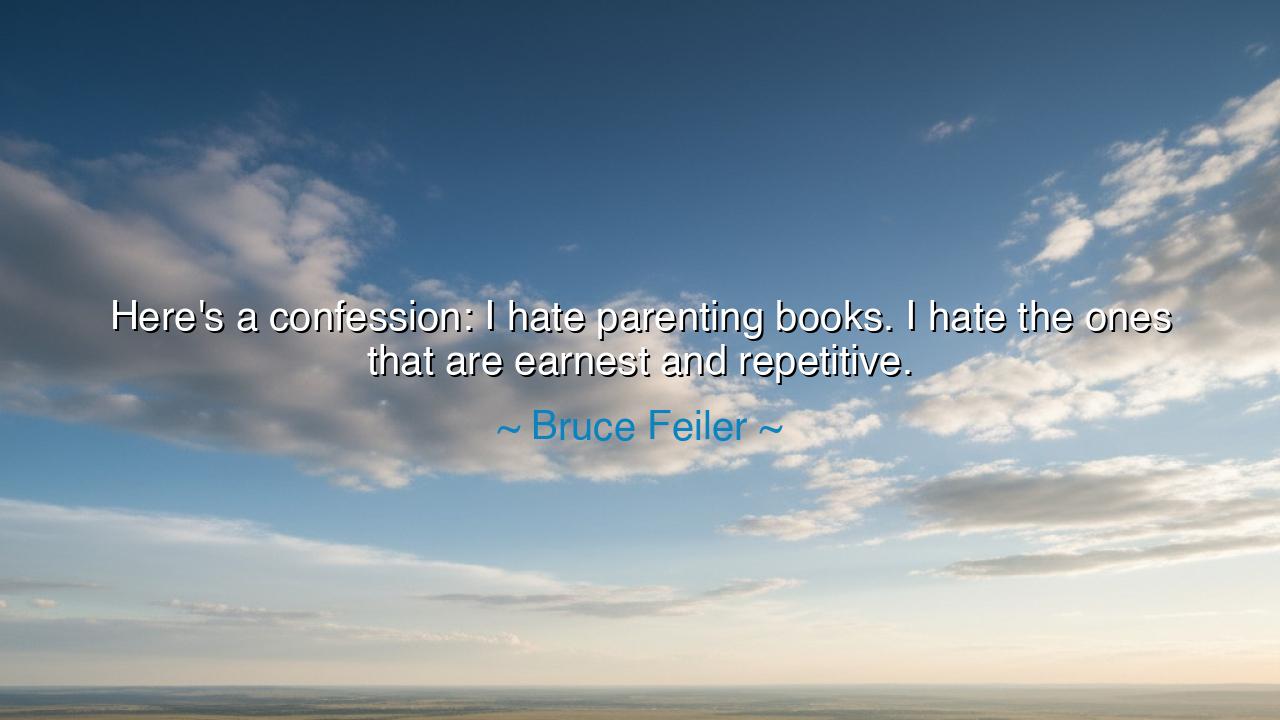
Here's a confession: I hate parenting books. I hate the ones
Here's a confession: I hate parenting books. I hate the ones that are earnest and repetitive.






In the words of Bruce Feiler, there is honesty both sharp and refreshing: “Here’s a confession: I hate parenting books. I hate the ones that are earnest and repetitive.” These words strike against the heavy weight of prescriptive wisdom that often burdens parents. For Feiler, and for many, such books—though filled with rules and principles—often repeat the obvious, clothe life’s chaos in stiff formulas, and overlook the living, breathing truth: that every child is different, and every act of parenting must be lived, not read. His words are not rebellion against learning, but rebellion against rigidity, against the false promise that the mystery of raising a soul can be reduced to pages of tidy advice.
The ancients, too, wrestled with the limits of written wisdom. The philosopher Socrates distrusted writing itself, warning that it offered the illusion of knowledge without the reality of understanding. He believed true wisdom was alive—spoken, questioned, tested in the moment. So it is with parenting: books may offer principles, but the living art requires improvisation, patience, and love. Feiler’s dislike of repetitive, earnest manuals echoes this ancient caution: that truth cannot be learned by rote but must be embodied in life.
History gives us many examples. Consider the story of Abraham Lincoln’s stepmother, Sarah Bush Lincoln. She had no parenting books to guide her, no manuals of earnest repetition. Yet by kindness, steadiness, and instinct, she nurtured a young boy into a man who would carry the weight of a nation. Her parenting was not theory but practice, not repetitive instruction but attentive presence. In her example, we see the truth of Feiler’s words: children are not raised by books, but by the hearts and hands of those who love them.
Feiler’s words also carry a critique of modern culture, which often seeks certainty where none can exist. Parents, anxious to “get it right,” devour shelves of guides, each promising the key to perfect behavior, perfect sleep, perfect outcomes. But this quest for control leads to exhaustion, comparison, and guilt. The earnest repetition of advice becomes a prison, rather than a liberation. Feiler confesses his hatred not out of arrogance, but out of the recognition that parenting is too wild, too human, too sacred to be reduced to formulas endlessly recycled.
The meaning, then, is deeply emotional: parents must learn to trust themselves. Books may inspire, but they cannot replace the wisdom born of sleepless nights, tender embraces, or difficult choices. Every family is its own universe, every child a singular flame. To cling too tightly to the words of others risks extinguishing the spark of instinct, creativity, and love that lies within every parent. Feiler’s rejection of parenting books is, at its core, an affirmation of life’s messiness and the sufficiency of love.
The lesson for us is clear. First, let us not scorn wisdom, but let us be wary of repetition that promises certainty where there is only mystery. Second, let us read less with the mind and live more with the heart, trusting that love, presence, and humility are greater than any manual. Third, let us seek counsel when needed, but always return to the truth that no book knows your child better than you do.
O seekers of truth, remember this: wisdom that is alive cannot be contained in repetitive words. It is discovered in tears and laughter, in patience and forgiveness, in the daily act of showing up again and again. Books may offer tools, but only the parent can wield them with discernment. Do not be enslaved by formulas; be guided by love.
Thus, Bruce Feiler’s words endure as a reminder. Reject not learning, but the false comfort of empty repetition. Raise your children with courage, instinct, and faith in the bond you share. For no book can teach you the shape of your child’s soul—it is you who must discover it, day by day, in the living practice of parenting.






AAdministratorAdministrator
Welcome, honored guests. Please leave a comment, we will respond soon